A few weeks back I took my sons to the Fayetteville Free Library to learn more about their new Fab Lab and see the 3D MakerBot printer in action. While we were busy printing out a robot and ring on the 3D printer, the librarian (Lauren) mentioned an upcoming open house for the Fab Lab that would include the 3D printer, making jewelry, and making things in Duct Tape…if she could find someone who made things with Duct Tape. Riley, my 11 year old said “I make stuff with Duct Tape,” and before Lauren knew what was happening he was flipping though pictures of his creations on his phone.
“Great” said Lauren without missing a beat “you could teach it.” And he did.
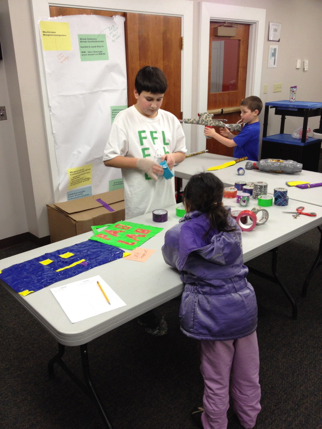
You should have seen him beam when Sue Considine, the amazing director of Fayetteville Free, personally thanked him for helping out.
A week later my youngest son said he had a great idea for this year’s science fair. “I’m going to design the library of the future!” he declared. Within 10 minutes he had sketched it out on paper.
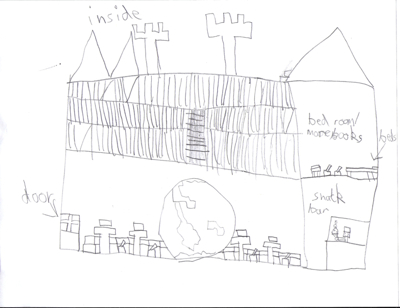
20 minutes after that he and his brother were building the library in Minecraft, a popular game akin to SecondLife, or SimCity. Sure they could build it in Legos (Andrew later did), but Legos don’t have working roller-coasters and you can’t invite your friends from around the world to walk through it (there are as I write this over 23 million registered Minecraft users).
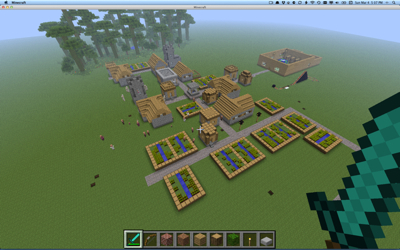
The next Saturday we took the “library” on a disk back to Fayetteville and printed it out.
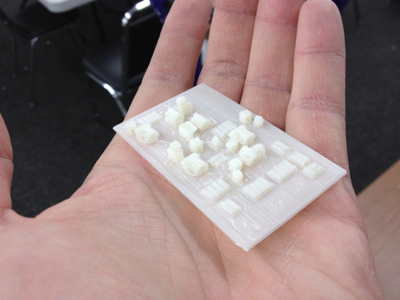
Now you might think this is the point when I to talk about millennials, or the power of Fab Labs (I don’t buy the millennial argument and I hope you know I LOVE the Maker Space in the library concept). But that’s not what sticks out to me about this story. What sticks out to me is the motivations my sons had, and how that was encouraged by the librarian. Sure the 3D printing was cool, but that’s not what hooked Riley. What hooked him was when Lauren asked him to teach the duct tape class. What got him hooked was when he came into the Fab Lab two weeks later and saw that the librarians had hung his duct tape Fab Lab sign on the door. What got Andrew hooked was sitting in front of the maker bot while it printed during the open house and got to explain how it worked, and what it was printing.
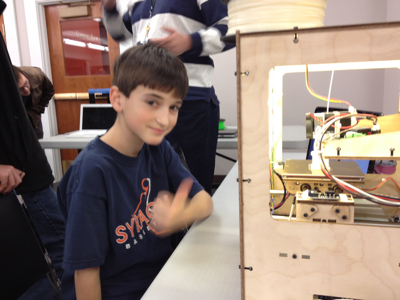
Recently – as our LIS students are hearing about participation, reading the Atlas of New Librarianship, following the Library of the People as part of Occupy Wall Street – they have been stopping by faculty offices and asking why we teach what we do, and forming their own lecture series to fill in the gaps they perceive in their preparations. They have reached out to the Hack Library School blog, and have been doing a pretty good job of usurping the school-wide tech blog. They want to know when we talk about the value and power of librarians regardless of institution, why they are being taught to only work in one type of institution. They want to know why curriculum only gets overhauled every 10 years. They are holding the faculty to account in ways as never before. To paraphrase the famous line – the students are revolting…and I think I like it.
And in the midst of this, the faculty are looking for new models. One that is of frequent conversation is the “flipped classroom.” The one where “students do homework in class and classwork at home.” The one where students do project based work in the class and listen to the lectures online. So in the middle of this discussion – in the middle of 3D printing – in the middle of student run symposia – it hits me. I apologize to all who find this obvious, and I could probably have said these words before, but it really hit home for me:
While we sit here and debate when we deliver our lectures, or how long they are, or in what channels; the real flip is already occurring. The lecture? The long form or short form, oratory? That is not the point of this. They all have a place. No, the real flip is faculty are losing control. The real flip is from us – LIS faculty – thinking we have the content and we are just debating the delivery to the truth that we need to relearn the content continuously right along side our students.
That last bit, the relearning bit, that is crucial. This is not simply ceding control, or turning education into one long do it yourself project. There is value in a good teacher and a good researcher – they will always have a strong ability to guide. No, it is about realizing that truly co-owning a curriculum, or library program, requires constant reinvention if for nothing else than applying it to new contexts. It is why the university model of researcher/teacher has worked so well for so long…it is in the disconnection of these two things that we run into breakdowns.
The same is true of our libraries. The Maker Space concept does not work unless all are involved – librarians, members, experts, children, parents – understand that they are all learning at the same time. If a kid shows up and is trained and treated as a consumer, the Maker Space will fail. No $2,000 MakerBot can match the quality of a store bought lego or toy. No, the trick is to show the child, or parent, or member, that they are part of a learning process and discovering something new – if only it is new to them. They have to be in on the truth that we are all just figuring this out as we go. And if we have it all figured out? Time to try something new.
I know there are long discussions to be had about the role of experts, the value of experience, and pedagogy of well known and new areas. I get that. I know I am oversimplifying here, but that is kind of the point. Those discussion of expertise and pedagogy need to be just that – discussions – conversations. They are messy, and there is a huge amount of ego riding on them. And yet, if we don’t open those conversations up beyond the faculty – beyond the librarians, then we have shut down a most remarkable opportunity for motivation and student/member involvement. And if we shut down conversation we have failed in our mission.

Most significant to me is the role of mentors and advocates who support others to be learners and contributors. Your son was empowered to share and join in the conversation by a wise librarian. If Flipping the classroom allows more time for conversation and collaboration — it is good.
Dave, great post. It’s nice to see faculty get it. But the real “losing control” needs to take place at the administrative level. The faculty will go for it, more or less. But the real threat is the loss of tuition money.
Why on earth is any LIS student anywhere paying a penny for a MLS degree? What do students get from an MLS education besides debt? So long as these students are being buried under criminal levels of debt, no real “loss of control” has taken place.
The big idea, as I see it, is that once the students take over, their’s no point in paying anymore. The students can teach themselves and each other and let the “universities” be reclaimed by nature.
I love the library of the future. I wish that there were some resources to actually build it. The MLS of the future should take place in the library itself, not the university. The students will be paid clerks at training libraries who then go on to be librarians at non-training libraries, debt free.
I think the worst thing that could happen is if librarianship returns to an apprenticeship model. There needs to be a place for driving practice forward without the daily constraints of production. Students also need a place where they can accelerate learning, and devising new approaches. Students also need a place where they can look across organizational boundaries (and even the idea of the organization itself). I think the university plays a central role in that.
Some look at library school as a sort of accelerated training ground – I disagree. The university is one of the few remaining places that can sustain argument over a long period of time. It is one of the few places where students can experiment and invent outside the confines of institutional constraints and the high stakes of pay for performance.
Should students have more interaction with praxis and more real world activities, absolutely. Should there be a fuzzier line between practices and the classroom? Yes. Should students have a greater roll in designing curriculum? Yes. Does this mean we don’t need places dedicated to a mix of praxis and theory? No.
I think we can both agree that the business model of universities is in need of massive overhaul – does that mean there is no value in them? I don’t think so (or else I wouldn’t be working at one). There is value in a graduate degree that challenges people to go beyond application, and go beyond what is now. I see a lot of value in the MLIS. Do I wish we could do it more cheaply? Absolutely. Do I think we can do it without guides that look across libraries? I’m more skeptical.
You may say this is a self-serving position. That of course a professor in an MLIS program wants to keep his job. That also assumes that I’m willing to compromise my personal beliefs and ethics for a paycheck. I believe in the work I do and the value of a graduate education. I believe in an institution that is dedicated to not simply reproducing what exists, but to innovating and pushing it forward without the constraints of keeping the doors open.
My approach to learning is that it occurs through conversation. That means I believe that all parties in that conversation have a voice. That means students being able to shape their learning and their learning environment. But you can’t stop there. It also means that faculty have a voice as well. I can’t tell you the number of students who come back years later and say “that management course I hated and didn’t want to take? That was the most valuable course I had.” Faculty act as guides and ask the students to join them in envisioning the future. There needs to be a place to do that.
Are there other ways to becoming a librarian? Sure. Do I think we need to look at redefining the continuous learning ladder? Absolutely. I’ve said it before: we need to extend the ladder to include undergraduate education, and doctoral education in formal learning settings. We also need a coordinated system of continuous education for librarians in the field. The profession needs to recognize these alternative approaches, but not accept folks who become librarians solely by job title who don’t dedicate themselves to continuous learning and innovation. That works the other way, there is an equal expectation upon librarians with an MLIS degree AND faculty to be engaged in continuous learning.
I certainly find value in universities, I just wish I could find one. Show me a genuine university in the US, one that hasn’t morphed into a corporation? Show me a university that would laugh at the idea of Jamie Dimon preaching to grads about holding yourself accountable.
I don’t think we disagree about the value of education and of real universities. But if we were both to describe our ideal place to facilitate this learning conversation I would say that this description will sound a lot more like a library and a lot less like the iSchool. Libraries already are universities in a very important way.
The whole point, the big idea, is that students can create a genuine university on their own. This conversation is a conversation that can be facilitated without a corporate mediator that exploits not just the students, but half of the faculty as well.
I can think of a lot of scenarios that are worse than an apprenticeship model. Here’s one scenario: tuition rising by 4% in 2012-2013, starting librarian salaries staying flat and falling behind inflation. A system that requires an MLIS degree that will bury you under decades worth of crushing debt. A system that is indistinguishable from indentured servitude ( http://dissentmagazine.org/article/?article=1303 ), leaving librarians to spend 30 years paying back (mostly worthless) piece of paper that is required to get their job. A system that produces a recent PLA presenter who has been a librarian for 10 years and, looking back on it, says she wishes she could have just cut a check for $35,000 to get her diploma and start work immediately. Sounds pretty dystopian to me. I’d rather learn at my local public library.
Dave, I love you. I want you to help tear down this current model and help us build a better one. With real schools like the Public School, with MITx, with P2P Universities new badges program, traditional universities like SU won’t last the next 15 years. It’s coming down whether we like it or not. But we can help shape what will replace it now. Help us burn it down!
The first step, getting the ALA to broaden it’s idea of accreditation to allow for alternative models.
The second step, getting a working library accredited to grant MLIS degrees.
We’d like you to teach at our university when we build it.
I know dave knows about it, but for other people who might be lurking here, here’s a video describing our Public Praxis class which is trying to inaugurate this kind of genuine free education, one that can become a real threat to exploitative “universities”: http://youtu.be/kWEGnci1oJw
It was in this class last year that Lauren began her FabLab project which is now at the Fayetteville Free Library.
Some other great links:
The Student Debt Refusal Campaign: http://www.occupystudentdebtcampaign.org/
The Public School (we want to build this kind of school at public libraries): http://all.thepublicschool.org/
The brand new Occupy University: http://university.nycga.net/
The University for Strategic Optimism: http://universityforstrategicoptimism.wordpress.com/inaugural-lecture/
Our own alternative school in Syracuse, The Art School in the Art School: http://www.theasintheas.org/
Our attempt to organize a large scale debt strike: http://www.alternet.org/story/152963/debtor's_revolution%3A_are_debt_strikes_another_possible_tactic_in_the_fight_against_the_big_banks/
Another 2 cents. Too many years ago, I got my MLS at the iSchool — non-traditional to say the least — Dean Robert Taylor was the visionary at the time. It was the best experience I’ve ever had. That degree was the reason I broke into consulting in NYC, started a successful company 20+ years. I received my MBA from the Stern school while working 60-80 hours a week to pay the tuition. I made a decision four years ago to pursue a doctorate. While Stern was on my radar — the only “place” I wanted to be was back at the iSchool. The freedom to do cross-disciplinary work, be around others who are not boxed into one way of thinking, one set of theories — to be around visionaries once again … that is why I returned to the iSchool. Do I wish it was less costly, yes… Do I think that the dissertation format has to change to embrace multimedia interfaces, yes. and so on and so on… but I wouldn’t trade my iSchool education…
Sorry for making multiple posts here, but I just thought of the perfect place to start. The iSchool should open it’s books and make its finances public so that students and faculty can start questioning how resources are being used. Education doesn’t have to be this expensive, and the iSchool is a good example of administrative bloat and you could hope for.
I remember hearing one of your speeches last year about how you don’t like the “Read” posters and that instead you wish libraries would create “Question!” posters. Last year, when I was proposing my artist-in-residence idea to the iSchool, I also wanted to show the iSchool how easy it was to pay for but cutting back on the amount of catering they use. Have you ever noticed how the second floor of Hinds is always flooded with leftover catering food. It seems they cater every single meeting ever. If two people who know each other bump into each other in the hallway the meeting is catered. And this catering isn’t cheap. My guess is that if they cut the catering budget in half it would more than pay for an artist-in-residence, but there was no way to tell for sure because the iSchool’s finances are not public. So I sent an e-mail asking if someone could tell me how much the school spends on catering. The response was that this was an outrageously bold question. Think about that for a second. A simple, strait forward question about how money is spend it considered too bold. Any institution that doesn’t allow even these meek questions cannot call itself a university.
So, yes, let’s make “Question” posters. Here’s my first one. How does the iSchool spend it’s money? I’m not asking for faculty member’s personal salaries, but I do think it’s okay to make the administration’s salaries public. Where does the iSchool get it’s money? How much of this is debt financing from student loans? What areas of administrative bloat could we cut to lower the cost of tuition?
This would be the logical first place to start if we want to make LIS education cheaper.
One of the demands of the Student Debt Refusal Campaign is:
“* We believe that private and for-profit colleges and universities, which are largely financed through student debt, should open their books.”
Let’s make it happen at SU, or at least at the iSchool! Question!
Looks like the diversity of high-quality resources might be creating different educational genres. This makes sense, doesn’t it, and wouldn’t it be a big relief if the 4-year university were not the only socially respectable post-secondary option? Imagine teaching a classroom of undergrads who were eager to engage, or at least at some point had sincerely and autonomously decided to be in school and to enroll in your class. Seems like that would improve the working lives of professors and students.
Genre-wise, Thomas appears to be taking the punk approach, with its DIY learn-this-chord,-now-another,-now-form-a-band style of engagement. I think public libraries make a great setting for this punk educational movement. Lauren and Riley’s arrangement with the Duct Tape class is Punk. It’s perfect and revolutionary. In Thomas’s talk of the exploitative university with no worthwhile future, I hear Johnny Rotten rendering an irreverent version of God Save the Queen, which shaped pop history, referred to as “The last and greatest outbreak of pop-based moral pandemonium.” Rotten explained the incendiary lyrics saying “You don’t write a song like ‘God Save The Queen’ because you hate the English race. You write a song like that because you love them, and you’re fed up of seeing them mistreated.” His intentions were apparently to evoke sympathy for the English working class, and a general resentment for the monarchy (from wikipedia).
So Thomas Gokey, by all means sing it: God Save the Deans. I support an outbreak of education-based moral pandemonium.
But also, I so badly desire “a place for driving practice forward without the daily constraints of production”, so it’s not actually enough to just reform schools. My library would need to rethink its expectations of me. I don’t only want to facilitate others’ learning, I myself want occasional, protracted access to learning–Access to people who know more than I do who agree to teach me, talk with me, work out ideas together. I wish I didn’t have to do all my education as a single, up-front investment but rather could move back and forth, work a couple years, go to school for a semester, work, school, work, school. A kind of professional crop rotation or something. If we’re all going to be teachers in this giant P2P public school, we all will need sabbaticals.
I like this. Thomas asked why someone would pay for a MSLIS. I think the more opportunities for learning and recognizing learning the better. I absolutely agree there are folks who will do better outside of the university setting innovating and learning some fields. It opens up the question of accrediting this. No, I don’t mean accrediting it in the sense of a formal guild system that acts as a gatekeeper, but a system to make knowledge transferable and recognizable from one setting to another.
This will bring up the business model discussion. A former mentor Jeff Katzer said the class is free, the grading costs money. You see this in the MIT experiment with open courses. Take all the classes you want for free, but if you want to gain university egis and backing for what you know you have to pay. This is not a matter of me looking for money, but me looking for some sustainable way of ensuring mentors exist and there is an incentive for those who know to share with those who don’t.
What’s interesting about the library field, though, is not a lack of educational opportunities, but the total lack of coordination. There are the masters degrees that at least have some coordination in both the market, and in accreditation by the profession, but then there are the amazing array of webinars, mentorships, conferences, self-paced tutorials, readings, and more. Right now the librarian has little to no guidance in what to pay attention to, what builds reputation, what furthers the mission or the career, etc.
We all need sabbaticals. An interesting fact I picked up at an Ivy League school. Librarians there are offered sabbaticals, but they are rarely accepted. That would be interesting to explore.
In any case, I love the conversation and the views. We should never be satisfied with the status quo.
Right now there really is only one option. Go to an ALA accredited MLIS program.
The business model that I envision is a working library. Students would get paid to be there. We’d abolish clerks and have students instead.
I maybe gave the wrong impression above. This isn’t just a learning-by-doing apprenticeship model of learning, although there would be quite a bit of that. There would be classes and coursework (and maybe even grades although I would prefer pass/fail). The librarians would also be the professors and part of their job would be to teach a class each semester. We could also have some outside professors join us, and perhaps some paid scholars in residence who would taking a heavier teaching load.
The key to making this kind of a school work would be getting the ALA to accredit the library to grant MLIS degrees. If we could get that students would end up graduating debt free and have a modest paying job for the two or three years that they spend completing their coursework. These training libraries would then seed the rest of the libraries around the world.
I think this would solve the double-bind criticism that MLIS programs always get, that they 1) might not be necessary at all, and 2) don’t actually prepare students to do the real work of being a librarian. This alternative model would largely replace #1 and actually do #2.
But for me the main benefit is getting a debt free education.
Following this comment thread has been interesting, to say the least. Still, what drives me to add my two cents is Thomas’s parting shot, above, that library schools “don’t actually prepare students to do the real work of being a librarian.” As a current student in one of those aforementioned library schools, I can tell you that there is quite a bit of disagreement on librarian’s Real Work. From where I’m standing, I’m quite a bit more employable working as a librarian OUTSIDE of a library than in it, so I’m not sure that a library-based training model (even one with classes and ALA accreditation) would actually give me the skills I need.
I’m reveling in the “extended argument.” Yes, spending two years in a prolonged existential crisis is a bit daunting, but the high level of scrutiny I’m applying to my interests and my chosen field will only strengthen my resolve. Dave is correct: graduate school is indeed “a place where students can experiment and invent outside the confines of institutional constraints…” More than that, universities, with their current design, allow for cross-pollination with other disciplines in ways that no training ground could possibly provide in another setting. Admittedly, I occasionally feel like the only person in my program who’s walking-the-walk when it comes to finding other departments and getting to know other students, but I *know* I’ve been changed for the better by my association with non-information-studies students, both grad and undergrad.
My master’s program is in library and information sciences, and that plural matters. Library work is a relatively small part of my multimodal, interdisciplinary degree, and I fully intend to take advantage of the university environment to enrich that degree in every way I can. Will I call myself a librarian? Probably, and when I do I’ll be referring to the education, ethics, and focus that I have when working with information. Will I end up working at a library? Who knows.
I have been dismayed by the lack of “practical” experience gained through the iSchool LIS program, I would like to see a student run physical and/or digital library so that the IST613 projects could actually be implemented rather than just sitting around and talking about it. There is a heck of a lot more to project management than just writing up a project plan.
Ideas are a dime/dzn. We’ve all got great ideas, but in doing the work of librarianship, thinking and talking and writing about our ideas is insufficient. The real work and hard thinking is often in realizing an effective form for our ideas to take in the context of our work. Not just thinking about stuff but rethinking, accommodating various constraints, maintaining the integrity of the idea while building creative workarounds. When Tom and I teach our innovation class we run it like a studio art class where students are expected to make. If done well–carefully and seriously–the making process should require as much intellectual inquiry and rigor as anything. I think the ‘practical’ is often dismissed as less intellectual and therefore less worthy of an academic curriculum. I’m talking about something that would push students harder though, would ask them to go further. Expect more, no?
I’ve been talking with an architecture class in Harvard’s school of design this semester (the class is called Bibliotheca II: The Library Test Kitchen), and I’m jealous of those students who are being taught, for example, different approaches to solving a problem. They’re learning how to use and improve their creativity tackling library problems, and I wish we could all sit in.